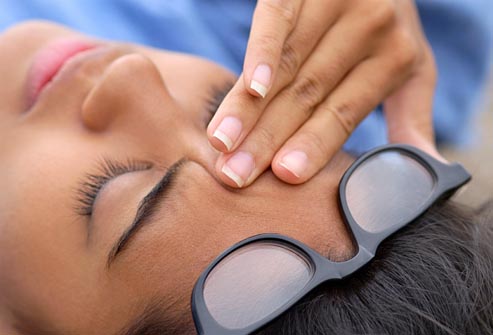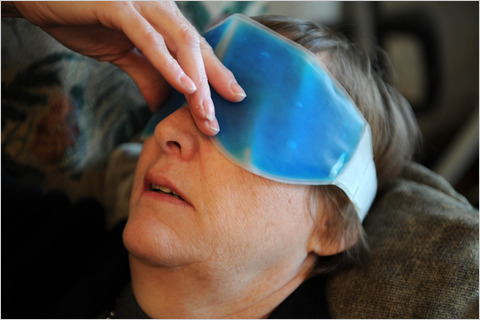
Headache is a pain that is experienced in the head or the upper neck area. It can range from mild to severe. It is of different types depending on the cause behind it. The real fact is that there are different types of headaches depending on the cause behind it. Broadly, it can be classified as primary headache and secondary headache. The primary headache includes migraine, tension and cluster headache. The secondary headache is the one that is caused by some other associated disease or ailment. Here are some of the myths attached to it.
Headache is a psychological problem. Headaches do have a strong connection with a person’s mental or psychological condition, but it basically originates from a person’s physical or biological condition. To be precise, headaches are the result of biochemical changes in the brain. Therefore, headaches are a biological disorder and not what is generally believed. Headaches are probably known as the most common medical illness around the world. However, there is no denial that psychological factors such as stress can contribute to the intensity and frequency of headaches.Headaches occur only in adults.
Headaches do have a strong connection with a person’s mental or psychological condition, but it basically originates from a person’s physical or biological condition. To be precise, headaches are the result of biochemical changes in the brain. Therefore, headaches are a biological disorder and not what is generally believed. Headaches are probably known as the most common medical illness around the world. However, there is no denial that psychological factors such as stress can contribute to the intensity and frequency of headaches.Headaches occur only in adults.
Headaches can and do affect people of any age. Contrary to the myth, research findings say that headaches perturb adolescents and children too. In fact, even infants may not be barred from headaches as the occurrence of the problem has been diagnosed in infants too. Research shows that around 6 percent of children experience headaches prior to reaching puberty. But, most parents of such kids are unwilling to believe the fact and take it as an attention seeking gimmick of young kids. Children suffering from headaches can blame the problem on their genetic factors. It has also been found that most headaches that children experience are benign.
Brain tumor is a common cause behind headaches, especially when they are recurrent.
Brain tumors do cause headaches, but the good news is that they are not the common cause behind headaches as is usually believed. In fact, the incidence of headaches occurring due to brain tumor, or any other serious or complicated brain disorder, is quite rare. As per the figures that research shows, more than 130 million Americans suffer from headaches whereas the number of people having headaches due to brain tumor is restricted to tens of thousands only, i.e., only these number of people are diagnosed with brain tumor every year.
Caffeine helps cure headaches.
Well, even if there is some truth to this myth, this cannot be said to be completely true. A cup of tea or coffee, or a medicine containing caffeine may help you get some relief from your headache, but that’s a temporary solution for an instant relief. If the help of caffeine is taken frequently to get relief from headaches, it might actually cause more harm to your already existing headache problem. Regular intake of drugs containing caffeine or more than 2 cups of coffee or any other dietary caffeine can make your headaches more severe and difficult to manage.
Headaches are not a serious problem.
Usually, headaches are not a life threatening problem and it is very rare that they indicate a more serious and complicated illness. But even then, headaches, either recurrent or severe, can damage the quality of your life to a great extent. Headaches can lessen your abilities to cope with even minor problems in your life and can strain your personal or family relationships. They can hinder your professional progress and disturb your leisure activities. Sometimes headaches can even lead to disability.
Medication is the only efficient answer to a headache problem.
If you believe that consuming medicines or drugs that are available over-the-counter is sufficient and may be the only way to get relief from your recurrent or severe headaches, you need to think again. Medications might be helpful in providing relief from headaches and are often a very important part of headache management, but these are still not the complete answer to your problem. In fact, frequent use of certain medicines can lead to occurrence or worsening of your headaches. As headaches result from many factors combined together, there’s no one or particular solution to it. You must seek proper advice from your physician to learn more about handling or managing your headache.
Headaches are a disorder only affecting women.
Headaches occur due to various kinds of triggers or factors, but so far none of the studies have linked it to a particular gender. While tension headaches occur in men and women equally, cluster headaches are five times more likely to occur in men than in women. Though, migraine headaches that are triggered by hormonal factors are more prone to occur in women than in men in a ratio of 3:1. But, still there is no evidence that migraine headaches are related to gender.
A sufferer has to bear headaches for a lifetime if all the tried and tested remedies fail.
You might have tried a few remedies, medications, or treatments and ended up without being benefited by them. It doesn’t mean that you will have to suffer from headaches throughout your life. There is no single known factor of headaches, nor are there any particular diagnosis to find out the root cause of the problem. Hence, it may be difficult to find an effective treatment for your headaches. So, it is worth experimenting with various types of remedies that might include medications or other drug-free techniques. One can also seek referral from a headache specialist . It is true that there is no remedy that can cure headaches permanently. But, with proper knowledge, medical guidance and effort it is possible to reduce the severity or the effect of headaches.
Severe headaches indicate migraines, whereas a sinus headache is indicated by pain in the sinuses. There are so many symptoms of headaches and hence it is difficult for even medical experts to diagnose them accurately. Comparatively, it is easier to diagnose a sinus headache, because it is accompanied with green or yellow nasal discharge. But, it is still not easy to diagnose a migraine headache. A severe headache may or may not be a sign of migraine. You can have a serious or severe headache even out of other factors like sinus, stress, etc.
There are so many symptoms of headaches and hence it is difficult for even medical experts to diagnose them accurately. Comparatively, it is easier to diagnose a sinus headache, because it is accompanied with green or yellow nasal discharge. But, it is still not easy to diagnose a migraine headache. A severe headache may or may not be a sign of migraine. You can have a serious or severe headache even out of other factors like sinus, stress, etc.




